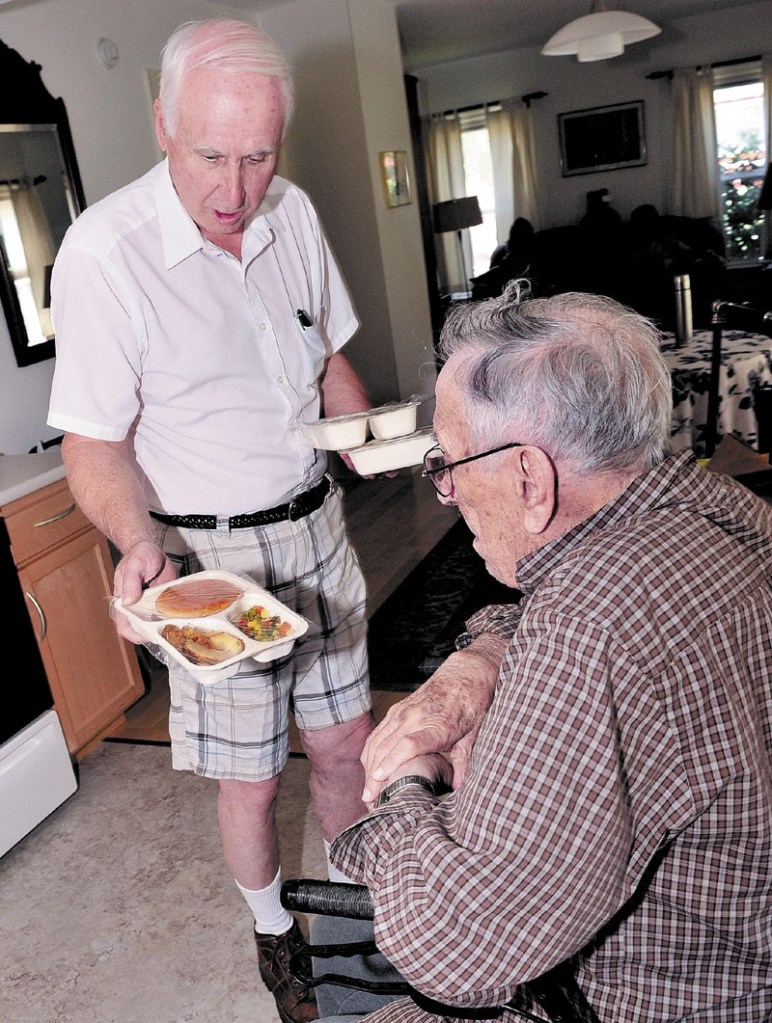WATERVILLE — Gil Pelletier walked into the house on Boutelle Avenue and warmly greeted 91-year-old Thaddy Gondela.
Pelletier, a Meals On Wheels volunteer driver, showed Gondela the two frozen meals and hot one he had for him. Gondela said the meal service has been important to him ever since his wife, Marilyn, died in 2004.
“I can’t cook in the kitchen; my wife did all the cooking,” Gondela said. “I wish I had a garden.”
Soon, though, Gondela’s meals are apt to be more like they came straight from the garden.
Spectrum Generations, which runs the Meals On Wheels program and provides community center dining in central Maine, is set to launch a new program in the fall that incorporates a lot more Maine-grown food into its meals for the elderly.
The We Sustain Maine program aims to end senior hunger in less than a decade while also providing more fresh fruit, vegetables, poultry, beef and dairy from local farms.
That sounds good to Gondela, who most enjoys roast beef and all kinds of vegetables. “I think it’s a great idea,” he said.
The new effort, which officials hope will last for years to come, is supported by a $50,000 grant from the Walmart Foundation.
Dorothy Freeman, the development director for Spectrum Generations, also said the organization received a gift from philanthropist Elsie Viles of Augusta.
Freeman said the program will come at an important time. Maine, according to Census data, has the fourth-oldest population in the U.S. and the oldest in New England, Freeman said. While the elderly face a number of issues, including long-term care and health, perhaps no issue is more serious than hunger, she said. Maine is the ninth most “food insecure” state in the U.S. and the highest in New England, Freeman said, citing a study by the Meals On Wheels Association of America.
During the last year, the Meals On Wheels delivered through Spectrum Generations in central Maine have risen from 260,000 to 300,000 within a 6,600-square-mile coverage region.
The cost of preparing each meal is about $5.75, Freeman said, and when funding is factored in state and federal sources, plus private donations, that cost per meal is still $4. That’s a $1.2 million gap the organization must fill through other sources.
The new We Sustain Maine program may help address those cost problems while also providing healthier foods to seniors who receive Meals On Wheels and who eat at its community center dining areas in Waterville and Hallowell.
Spectrum Generations was the only Maine organization to win the one-year $50,000 grant. In its grant proposal, the organization said its program uses Maine-grown foods “from the fields of Maine’s farms to the plates of Maine seniors,” providing the elderly with better nutrition and also sustaining local farmers and the state economy.
Food would come through several vendors, primarily Sysco, who get their products from farms across Maine, including tomatoes from Backyard Farms in Madison. Food purchases would also come from Barrels Community Market in Waterville, which features products from local farms.
Freeman said the grant will help boost the organization in its fundraising drive to make the program sustainable for at least a decade or more. It’s expected to cost about $150,000 annually, she said, so additional grants and donations will be needed.
“Other Meals On Wheels around the nation may have thought of this, but we’ll be the first ones to make a commitment to do this,” Freeman said. “It makes Maine a national model of excellence.”
More meals
It will also allow Spectrum Generations to increase its capacity by 1,700 meals per week. The local foods will start showing up in meals in October, Freeman said.
Starting next year, the program will also feature a statewide exposition to showcase Maine-grown foods in a televised cooking competition, Freeman said.
“Cooks and chefs will come together to use locally-grown meats and veggies to create menus in keeping with menu standards, and we’ll have a group of celebrity judges and the winning entries will be incorporated into our menus each year,” Freeman said.
Now, about 1 or 2 percent of the organization’s foods come from Maine-based sources, according to Denver Brown, nutrition administrator for Spectrum Generations. Under the new program, the organization aims to get at least 30 percent of its food products from Maine sources. The nutrition standards will be above the recommended dietary allowances established by the federal government, Brown said.
That food will be healthier, Brown said, because food typically loses one-third of its nutritional value in the time it takes to transport it across the country and into the hands of customers. Now, nearly all of the organization’s vegetables come from Mexico and its meat comes primarily from Texas and Florida, Brown said.
With the new program, it’s possible a dinner of meat loaf, mashed potatoes and vegetables can all come from Maine farms, he said.
“It’s an old theory,” Brown said of using local foods. “But the chain stores demanded where products came from and the price dictates that, too. We’re hoping to start leading on this. Just to feed seniors is not enough — it’s to keep them healthy and living in their homes.”
Scott Monroe — 861-9239
smonroe@centralmaine.com
Send questions/comments to the editors.



Success. Please wait for the page to reload. If the page does not reload within 5 seconds, please refresh the page.
Enter your email and password to access comments.
Hi, to comment on stories you must . This profile is in addition to your subscription and website login.
Already have a commenting profile? .
Invalid username/password.
Please check your email to confirm and complete your registration.
Only subscribers are eligible to post comments. Please subscribe or login first for digital access. Here’s why.
Use the form below to reset your password. When you've submitted your account email, we will send an email with a reset code.